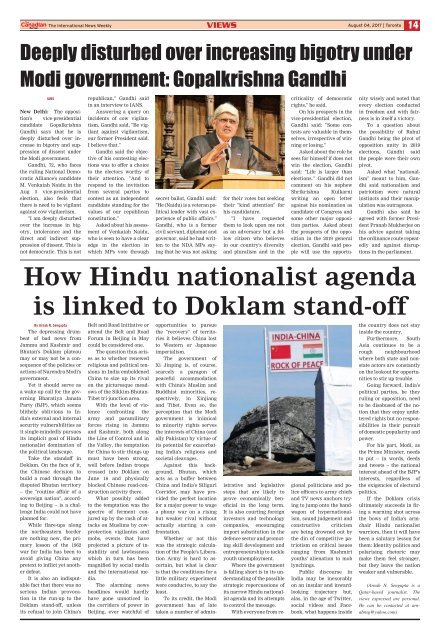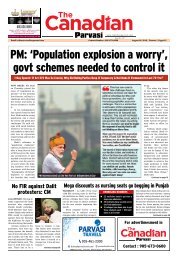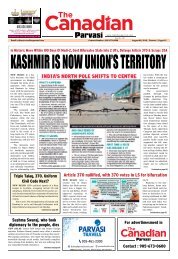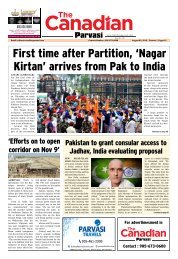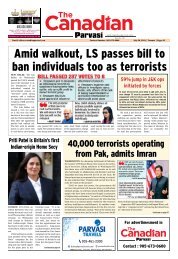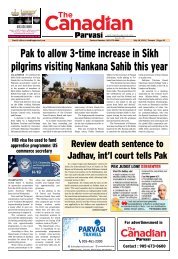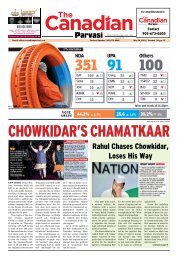The Canadian Parvasi – Issue 06
Create successful ePaper yourself
Turn your PDF publications into a flip-book with our unique Google optimized e-Paper software.
<strong>The</strong> International News Weekly VIEWS<br />
August 04, 2017 | Toronto 14<br />
Deeply disturbed over increasing bigotry under<br />
Modi government: Gopalkrishna Gandhi<br />
IANS<br />
New Delhi: <strong>The</strong> opposition's<br />
vice-presidential<br />
candidate Gopalkrishna<br />
Gandhi says that he is<br />
deeply disturbed over increase<br />
in bigotry and suppression<br />
of dissent under<br />
the Modi government.<br />
Gandhi, 72, who faces<br />
the ruling National Democratic<br />
Alliance's candidate<br />
M. Venkaiah Naidu in the<br />
Aug 5 vice-presidential<br />
election, also feels that<br />
there is need to be vigilant<br />
against cow vigilantism.<br />
"I am deeply disturbed<br />
over the increase in bigotry,<br />
intolerance and the<br />
direct and indirect suppression<br />
of dissent. This is<br />
not democratic. This is not<br />
republican," Gandhi said<br />
in an interview to IANS.<br />
Answering a query on<br />
incidents of cow vigilantism,<br />
Gandhi said, "Be vigilant<br />
against vigilantism,<br />
our former President said.<br />
I believe that."<br />
Gandhi said the objective<br />
of his contesting elections<br />
was to offer a choice<br />
to the electors worthy of<br />
their attention. "And to<br />
respond to the invitation<br />
from several parties to<br />
contest as an independent<br />
candidate standing for the<br />
values of our republican<br />
constitution."<br />
Asked about his assessment<br />
of Venkaiah Naidu,<br />
who is seen to have a clear<br />
edge in the election in<br />
which MPs vote through<br />
secret ballot, Gandhi said:<br />
"He (Naidu) is a veteran political<br />
leader with vast experience<br />
of public affairs."<br />
Gandhi, who is a former<br />
civil servant, diplomat and<br />
governor, said he had written<br />
to the NDA MPs saying<br />
that he was not asking<br />
for their votes but seeking<br />
their "kind attention" for<br />
his candidature.<br />
"I have requested<br />
them to look upon me not<br />
as an adversary but a fellow<br />
citizen who believes<br />
in our country's diversity<br />
and pluralism and in the<br />
criticality of democratic<br />
rights," he said.<br />
On his prospects in the<br />
vice-presidential election,<br />
Gandhi said: "Some contests<br />
are valuable in themselves,<br />
irrespective of winning<br />
or losing."<br />
Asked about the role he<br />
sees for himself if does not<br />
win the election, Gandhi<br />
said: "Life is larger than<br />
elections." Gandhi did not<br />
comment on his nephew<br />
Shrikrishna Kulkarni<br />
writing an open letter<br />
against his nomination as<br />
candidate of Congress and<br />
some other major opposition<br />
parties. Asked about<br />
the prospects of the opposition<br />
in the 2019 general<br />
election, Gandhi said people<br />
will use the opportunity<br />
wisely and noted that<br />
every election conducted<br />
in freedom and with fairness<br />
is in itself a victory.<br />
To a question about<br />
the possibility of Rahul<br />
Gandhi being the pivot of<br />
opposition unity in 2019<br />
elections, Gandhi said<br />
the people were their own<br />
pivot.<br />
Asked what "nationalism"<br />
meant to him, Gandhi<br />
said nationalism and<br />
patriotism were natural<br />
instincts and their manipulation<br />
was outrageous.<br />
Gandhi also said he<br />
agreed with former President<br />
Pranab Mukherjee on<br />
his advice against taking<br />
the ordinance route repeatedly<br />
and against disruptions<br />
in the parliament.<br />
How Hindu nationalist agenda<br />
is linked to Doklam stand-off<br />
By Arnab N. Sengupta<br />
<strong>The</strong> depressing drumbeat<br />
of bad news from<br />
Jammu and Kashmir and<br />
Bhutan's Doklam plateau<br />
may or may not be a consequence<br />
of the policies or<br />
actions of Narendra Modi's<br />
government.<br />
Yet it should serve as<br />
a wake-up call for the governing<br />
Bharatiya Janata<br />
Party (BJP), which seems<br />
blithely oblivious to India's<br />
external and internal<br />
security vulnerabilities as<br />
it single-mindedly pursues<br />
its implicit goal of Hindu<br />
nationalist domination of<br />
the political landscape.<br />
Take the standoff in<br />
Doklam. On the face of it,<br />
the Chinese decision to<br />
build a road through the<br />
disputed Bhutan territory<br />
-- the "routine affair of a<br />
sovereign nation", according<br />
to Beijing -- is a challenge<br />
India could not have<br />
planned for.<br />
While flare-ups along<br />
the northeastern border<br />
are nothing new, the primary<br />
lesson of the 1962<br />
war for India has been to<br />
avoid giving China any<br />
pretext to inflict yet another<br />
defeat.<br />
It is also an indisputable<br />
fact that there was no<br />
serious Indian provocation<br />
in the run-up to the<br />
Doklam stand-off, unless<br />
its refusal to join China's<br />
Belt and Road Initiative or<br />
attend the Belt and Road<br />
Forum in Beijing in May<br />
could be considered one.<br />
<strong>The</strong> question thus arises<br />
as to whether renewed<br />
religious and political tensions<br />
in India emboldened<br />
China to size up its rival<br />
on the picturesque meadows<br />
of the Sikkim-Bhutan-<br />
Tibet tri-junction area.<br />
With the level of violence<br />
confronting the<br />
army and paramilitary<br />
forces rising in Jammu<br />
and Kashmir, both along<br />
the Line of Control and in<br />
the Valley, the temptation<br />
for China to stir things up<br />
must have been strong,<br />
well before Indian troops<br />
crossed into Doklam on<br />
June 16 and physically<br />
blocked Chinese road-construction<br />
activity there.<br />
What possibly added<br />
to the temptation was the<br />
spectre of ferment conjured<br />
up by the rash of attacks<br />
on Muslims by cowprotection<br />
vigilantes and<br />
mobs, events that have<br />
projected a picture of instability<br />
and lawlessness<br />
which in turn has been<br />
magnified by social media<br />
and the international media.<br />
<strong>The</strong> alarming news<br />
headlines would hardly<br />
have gone unnoticed in<br />
the corridors of power in<br />
Beijing, ever watchful of<br />
opportunities to pursue<br />
the "recovery" of territories<br />
it believes China lost<br />
to Western or Japanese<br />
imperialism.<br />
<strong>The</strong> government of<br />
Xi Jinping is, of course,<br />
scarcely a paragon of<br />
peaceful accommodation<br />
with China's Muslim and<br />
Buddhist minorities, respectively,<br />
in Xinjiang<br />
and Tibet. Even so, the<br />
perception that the Modi<br />
government is inimical<br />
to minority rights serves<br />
the interests of China (and<br />
ally Pakistan) by virtue of<br />
its potential for exacerbating<br />
India's religious and<br />
societal cleavages.<br />
Against this background,<br />
Bhutan, which<br />
acts as a buffer between<br />
China and India's Siliguri<br />
Corridor, may have provided<br />
the perfect location<br />
for a major power to wage<br />
a phony war on a rising<br />
but weaker rival without<br />
actually starting a confrontation.<br />
Whether or not this<br />
was the strategic calculation<br />
of the People's Liberation<br />
Army is hard to ascertain,<br />
but what is clear<br />
is that the conditions for a<br />
little military experiment<br />
were conducive, to say the<br />
least.<br />
To its credit, the Modi<br />
government has of late<br />
taken a number of administrative<br />
and legislative<br />
steps that are likely to<br />
prove economically beneficial<br />
in the long term.<br />
It is also courting foreign<br />
investors and technology<br />
companies, encouraging<br />
import substitution in the<br />
defence sector and promoting<br />
skill development and<br />
entrepreneurship to tackle<br />
youth unemployment.<br />
Where the government<br />
is falling short is in its understanding<br />
of the possible<br />
strategic repercussions of<br />
its narrow Hindu nationalist<br />
agenda and its attempts<br />
to control the message.<br />
With everyone from regional<br />
politicians and police<br />
officers to army chiefs<br />
and TV news anchors trying<br />
to jump onto the bandwagon<br />
of hypernationalism,<br />
sound judgement and<br />
constructive criticism<br />
are being drowned out by<br />
the din of competitive patriotism<br />
on critical issues<br />
ranging from Kashmiri<br />
youths' alienation to mob<br />
lynchings.<br />
Public discourse in<br />
India may be inexorably<br />
on an insular and inwardlooking<br />
trajectory but,<br />
alas, in the age of Twitter,<br />
social videos and Facebook,<br />
what happens inside<br />
the country does not stay<br />
inside the country.<br />
Furthermore, South<br />
Asia continues to be a<br />
rough neighbourhood<br />
where both state and nonstate<br />
actors are constantly<br />
on the lookout for opportunities<br />
to stir up trouble.<br />
Going forward, India's<br />
political parties, be they<br />
ruling or opposition, need<br />
to be disabused of the notion<br />
that they enjoy unfettered<br />
rights but no responsibilities<br />
in their pursuit<br />
of domestic popularity and<br />
power.<br />
For his part, Modi, as<br />
the Prime Minister, needs<br />
to put -- in words, deeds<br />
and tweets -- the national<br />
interest ahead of the BJP's<br />
interests, regardless of<br />
the exigencies of electoral<br />
politics.<br />
If the Doklam crisis<br />
ultimately succeeds in firing<br />
a warning shot across<br />
the bows of India's armchair<br />
Hindu nationalist<br />
warriors, then it will have<br />
been a salutary lesson for<br />
them: Identity politics and<br />
polarising rhetoric may<br />
make them feel stronger,<br />
but they leave the nation<br />
weaker and vulnerable.<br />
(Arnab N. Sengupta is a<br />
Qatar-based journalist. <strong>The</strong><br />
views expressed are personal.<br />
He can be contacted at arnabnsg@yahoo.com)


